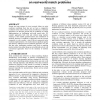Free Online Productivity Tools
i2Speak
i2Symbol
i2OCR
iTex2Img
iWeb2Print
iWeb2Shot
i2Type
iPdf2Split
iPdf2Merge
i2Bopomofo
i2Arabic
i2Style
i2Image
i2PDF
iLatex2Rtf
Sci2ools
112
click to vote
PVLDB
2010
2010
Evaluation of entity resolution approaches on real-world match problems
Despite the huge amount of recent research efforts on entity resolution (matching) there has not yet been a comparative evaluation on the relative effectiveness and efficiency of alternate approaches. We therefore present such an evaluation of existing implementations on challenging real-world match tasks. We consider approaches both with and without using machine learning to find suitable parameterization and combination of similarity functions. In addition to approaches from the research community we also consider a state-of-the-art commercial entity resolution implementation. Our results indicate significant quality and efficiency differences between different approaches. We also find that some challenging resolution tasks such as matching product entities from online shops are not sufficiently solved with conventional approaches based on the similarity of attribute values.
Related Content
| Added | 30 Jan 2011 |
| Updated | 30 Jan 2011 |
| Type | Journal |
| Year | 2010 |
| Where | PVLDB |
| Authors | Hanna Köpcke, Andreas Thor, Erhard Rahm |
Comments (0)

